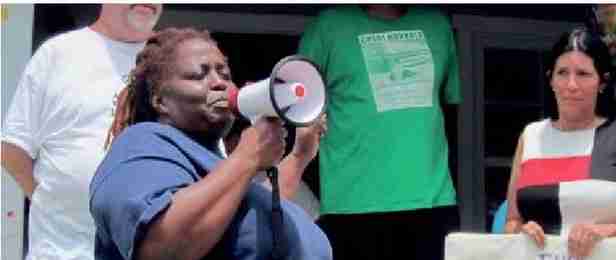By CHRISTOPHER O’DONNELL
Tampa Bay Times
TAMPA, Fla. – Sulfurous fumes seep from the walls of Valentine Hendrix’s home, slowly attacking her appliances and light fixtures, her lungs and sinuses.
It’s been that way for almost nine years.
In 2008, Hendrix’s family was one of 12 poor black families encouraged by the Tampa Housing Authority to become first-time home buyers in east Tampa. With down payment help from federal and city grants, they took out mortgages for new homes that cost up to $175,000.
But the homes were built with tainted Chinese drywall, the same material that marred an estimated 100,000 U.S. homes built during last decade’s boom and bust. Within months, light fixtures and wall sockets stopped working. Air-conditioning units kept breaking down.
The toll was human, too, with residents complaining of headaches, rashes, nosebleeds and breathing difficulties.
After the problems came to light, the developer and the Housing Authority argued over who was responsible. They still disagree today. Meanwhile, a class-action lawsuit against the Chinese drywall manufacturer has stalled.
With no help in sight, eight of the 12 families eventually walked away from their homes, their credit ratings ruined.
The rest remain, stuck making hefty mortgage payments on virtually worthless homes, still fearing for their health and future.
Hendrix, 51, is one of them, working two jobs to afford her $800 monthly payment.
Hendrix stays, living without air conditioning, without a working stove, without hope that things will get better. In most regards, the Belmont Heights project was a success.
In all, almost $900,000 in tax dollars helped pay for the homes built with toxic walls. The Housing Authority hired Michaels Development Co. as master developer of the project, leasing the land to the New Jersey company.
Michaels built the apartments but bid out construction of the single-family homes to Banner Homes of Florida, a small family company operating out of an office on Busch Boulevard.
Banner’s main drywall supplier was Clearwater company Black Bear Gypsum, said Dennis Mead, a Banner employee whose son David Mead owned the firm.
At the time, many suppliers had turned to Chinese manufacturers to keep up with the huge demand created by the housing boom and two busy hurricane seasons, said Will Spates, principal of Indoor Environmental Technologies, a Clearwater company that has inspected hundreds of homes for toxic drywall.
No one was aware then of the sulfur emissions that blackened and corroded copper coils and wiring and played havoc with smoke alarms.
As many as 30,000 Florida homes may have been affected, Spates said.
Banner Homes would likely have been found liable in court for using tainted drywall, as happened to other home builders.
But that hope vanished for Hendrix and her neighbors in bizarre circumstances.
In May 2007, Mead sold a controlling interest in his company to James Harvey, a 64-year-old investor. Harvey installed his girlfriend, Martina Hood, a 30-year-old Russian-born real estate agent, as company president and fired the Meads.
Months later, Banner filed for bankruptcy, long before any of the residents were aware of the toxic drywall. In the years that followed, both Harvey and his girlfriend died, Hood after a leap from her 29th-floor SkyPoint condo in downtown Tampa.
David Mead left the construction field to become a missionary pilot. He did not return calls for comment.













No Comment